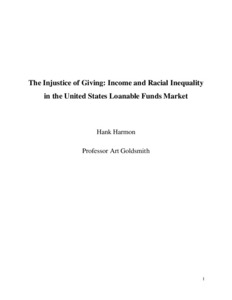The Injustice of Giving: Income and Racial Inequality in the United States Loanable Funds Market

View/
Author
Harmon, Henry J.
Subject
Washington and Lee University, Shepherd Poverty Program
Financial institutions
Banks and banking
United States
Loans
Mortgages
Poor
Discrimination in financial services
Intersectionality
Metadata
Show full item recordDescription
Capstone; [FULL-TEXT FREELY AVAILABLE ONLINE] Henry J. Harmon is a member of the Class of 2022 of Washington and Lee University. The loanable funds market plays an incredibly important role in the lives of almost every American. The mortgages, car leases, business loans, and student loans that generations of Americans have relied on to provide capital for their ideas, investments, and basic needs have helped the United States become one of the wealthiest nations in the world. Financial institutions and banks have provided loans to people across the nation to make sure they can thrive. Although these institutions have helped thousands, if not millions, achieve their financial and personal goals, they are not perfect. For as long as these financial institutions have been providing these life-changing loans, these same institutions have systematically excluded many subpopulations from the services and loans they provide. In particular, low-income communities and communities of color have experienced decades of discrimination in the loanable funds market. The extent of this discrimination has compounded over time and certain practices and policies within the loanable funds market continue to adversely impact the lives of these groups today. In this paper, we will explore the origins, consequences, and implications of market failures within the loanable funds market and how we can correct the years of mistreatment that poor and black communities have faced. This paper aims not only to carefully uncover the downfalls of the financial institutions and banks that provide loans, but also to critically examine ways in which these institutions can bring a safe market for loans to all Americans, no matter their income bracket or skin color. [From Introduction] Hank Harmon